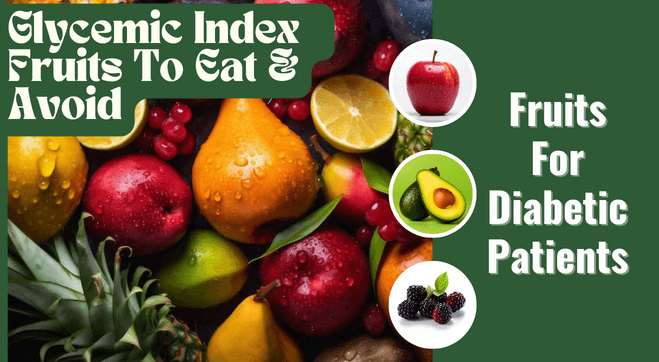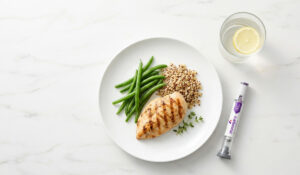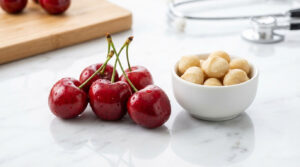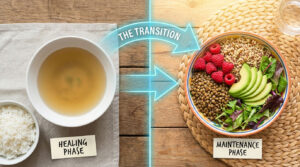It is a popular notion that fruits for sugar patients are not allowed. Fruit fructose, a natural sugar, and carbohydrates can raise your blood sugar levels. For individuals living with diabetes, making informed choices about food is paramount to managing blood sugar levels and overall health. Fruits, while rich in essential nutrients, can pose challenges due to their natural sugars. However, with careful selection and portion control, fruits can still be part of a healthy diabetic diet.
Many low-glycemic index fruits are also full of vitamins, minerals, and potent plant compounds called phytochemicals.
Phytochemicals may help in lowering your risk of heart conditions, cancer, and stroke, which is a big bonus for your health. This is because diabetes is directly linked to higher risks of heart disorders and other related issues. Many healthy fruits for diabetics are also rich in fibre, which slows down the digestion process. This, in turn, controls your blood sugar levels from shooting up.
Understanding Fruit Selection for Diabetes: GI Index and Glycemic Load
When choosing fruits for diabetic individuals, it’s essential to consider their glycemic index (GI) and glycemic load (GL).
The glycemic index measures how quickly a food raises blood sugar levels, Foods with a low GI (55 or less) are digested and absorbed slowly, resulting in a gradual rise in blood sugar levels, making them suitable choices for diabetic individuals.
Glycemic Index (GI) values are categorized as follows:
- Low: 55 or below
- Moderate: 56 to 69
- High: 70 and above
A lower GI score indicates a slower increase in blood sugar levels, facilitating better post-meal management by the body.
The glycemic load takes into account both the quantity and quality of carbohydrates in a serving.
Glycemic Load (GL) values are categorized as follows:
- Low: 0 – 10
- Medium: 11 – 19
- High: 20 & over
Glycemic Index and Glycemic Load of Fruits
|
Name |
GI |
GL |
Apricot | 34 | 3.8 |
Apricots (canned in syrup) | 60 | 12.9 |
Quince (canned / jelly without sugar) | 40 | 3.8 |
Quince (canned / jelly with sugar) | 65 | 7.2 |
Quince (fresh fruit) | 35 | 3.4 |
Cherry plum | 25 | 0 |
Pineapple | 66 | 8.6 |
Pineapple (canned in syrup) | 65 | 10.1 |
Orange (fresh fruit) | 35 | 4.1 |
Watermelon | 75 | 5.6 |
Acerola, Barbados Cherry (fresh) | 20 | 0.1 |
Banana | 48 | 10.1 |
Dessert Banana (Green) | 45 | 15.7 |
Dessert Banana (ripe) | 60 | 13.1 |
Platano (raw) | 45 | 14.4 |
Bananas (Dried) | 48 | 42.4 |
Grapes, green (raw) | 45 | 5.4 |
Grapes, red (raw) | 45 | 8.1 |
Grapes | 56 | 9.6 |
Grapes, black | 59 | 11 |
Cherry (sweet, fresh) | 25 | 4 |
Blueberry | 25 | 2 |
Pomegranate (fresh) | 35 | 6.7 |
Grapefruit | 22 | 0 |
Canned Grapefruit | 47 | 4.3 |
Pomelo, sheddock (fresh) | 25 | 2 |
Pear (fresh fruit) | 30 | 4.7 |
Melon pear (pepino) | 40 | 8 |
Canned pears | 55 | 8.6 |
Pears (dried) | 43 | 26.9 |
Melon | 65 | 5.2 |
Blackberry (fresh berry) | 25 | 2.5 |
Yellow gooseberry | 15 | 1.8 |
Raisins | 65 | 51.5 |
Raisins (red and gold) | 65 | 46.8 |
Fig (fresh) | 35 | 6.7 |
Fig (dried) | 50 | 28.9 |
Kiwi | 50 | 7.3 |
Strawberries (fresh berries) | 25 | 1.9 |
Cranberries (fresh) | 45 | 5.5 |
Dried apricots | 35 | 21.2 |
Lemon (Fresh Fruit) | 20 | 0.6 |
Lychee (fresh fruit) | 50 | 7.6 |
Lychee (canned syrup) | 79 | 14.8 |
Raspberries (fresh berries) | 25 | 3 |
Mango | 56 | 8.4 |
Mandarin | 30 | 3.9 |
Tangerine (canned) | 47 | 4.2 |
Passion fruit | 30 | 6.9 |
Cloudberry (fresh berries) | 25 | 1.7 |
Medlar japanese plum | 55 | 5.7 |
Nectarine (fresh fruit) | 35 | 4.1 |
Sea buckthorn | 30 | 0.8 |
Prickly pear (fresh fruit) | 35 | 3.4 |
Papaya (fresh) | 60 | 5.5 |
Pepino, melon pear | 40 | 8 |
Peach (canned in syrup) | 55 | 8.1 |
Peach (fresh fruit) | 35 | 4 |
Dried Peaches | 35 | 20.2 |
Platano (cooked) | 70 | 27.4 |
Plantano (Raw) | 45 | 13.6 |
Breadfruit | 65 | 17.6 |
Pomelo | 30 | 3 |
Passion fruit, granadilla (fresh) | 30 | 4 |
Plums (fresh) | 35 | 3.9 |
Red currant (fresh berry) | 25 | 1.9 |
Black currant (fresh berry) | 15 | 1.1 |
Dried fruits | 60 | 49.8 |
Tangerines, tangerines, satsuma (fresh) | 30 | 3.9 |
Physalis | 15 | 0.6 |
Dates | 70 | 48.4 |
Dried dates | 40 | 27.7 |
Persimmon, persimmon eastern (fresh) | 50 | 7.7 |
Sweet cherry | 25 | 0.1 |
Blueberries | 53 | 4 |
Prunes | 40 | 25.6 |
Dried apples | 35 | 20.6 |
An Apple | 36 | 5 |
Applesauce (unsweetened) | 35 | 4 |
Goji berries | 25 | 13.3 |
Can diabetic Patients eat all fruits and are there any fruits to avoid in diabetes? Read on to find out what fruits are good for diabetics.
Should Diabetics Eat Fruits?
Yes, the National Institute of Diabetes and Digestive and Kidney Diseases 1 recommends that people with diabetes include fruits for a balanced diet. However, while low-glycemic fruits are recommended for diabetics, it’s still advised to go easy on fruit juice due to its high carbohydrate content and lack of fibre. In this article, we’ll list the best and worst fruits for diabetics, so you know what fruits to include and how much fruit a diabetic can eat as well as which fruits should be completely avoided.
What Are The Best Fruits For Diabetics?
Fruits can be a part of a nutritious diet. They are quite high in fibre, minerals, nutrients, and antioxidants, which prevent the occurrence and progression of diseases and improve overall health.
You can refer to this list of fruits with low glycemic index for diabetics. However, you should be mindful about portion sizes when consuming even diabetic-friendly fruits:
- Apples: Apples are not a high-glycemic index fruit and they have high levels of soluble and insoluble fibre and can prevent fluctuations in blood sugar. They may also positively contribute to gut bacteria 2 and other benefits. Apples are, thus, one of the best fruits for diabetic people.
- Avocados: If you’re wondering best fruits for sugar patients then avocados should be at the top of your list. Avocados have a high range of healthy fats (MUFAs)3, which may help lower LDL levels, blood pressure, etc. They are also not too high in their sugar content. So, this is one of the fruits diabetics can eat.
- Blackberries: Blackberries, which have high fibre content, are one of the best fruits for diabetes. These berries also have a range of micronutrients and antioxidants4, which could promote overall health. Thus, you can safely include it in your fruit diet for diabetes.
- Oranges: Should a diabetic eat oranges? Yes. According to the American Diabetes Association, citrus fruits are classified as diabetes superfoods. Oranges are rich in Vitamin C, fibre, flavonoids, and potassium — all of which are good for combating diabetes.
- Cantaloupes: Cantaloupes are a fruit low in glycemic index, which means your blood sugar is unlikely to spike too much. Rich in vitamins, minerals, and hydration, they make a nutritious addition to diabetic-friendly diets
- Peaches: Peaches contain significant levels of fibre helping in weight loss and blood sugar control. Their relatively low GI makes them one of the best fruits for sugar patients.
- Plums: Plums are high in fibre5, low in calories, and are very good at managing diabetes. That’s why they’re a great addition to this list of fruits with a low glycemic index.
- Pears: Pears are high in dietary fibre, which means they help in regulating blood sugar. Their low GI makes them a safe and healthy choice for diabetics.
- Raspberries: Raspberries 6, with their high fibre content, can help people regulate their blood sugar levels.
- Strawberries: Strawberries with their high fibre content are great at managing diabetes. They are low in calories and high in antioxidants, which increase general health and immunity levels.
- Starfruit: Starfruit is low in calories, making it an ideal choice for managing body weight. Being high in fibre, this fruit also causes surges in blood sugar levels, making it diabetic-friendly.
- Guava: Rich in nutrients and low on calories but high in fibre, guava 7 is very good for weight management and diabetes control. It also regulates blood sugar levels.
- Cherries: Cherries are great for blood sugar control, owing to their low GI. They also aid in weight loss. Thus, cherries are a good food to include in your diet.
- Watermelon: Great to eat in summer, watermelons 8 is best in hydrating the body. They are low in sugar and are a healthy option for diabetics.
- Papaya: Is papaya good for diabetics? Yes! Papaya has a medium GI and can be eaten in moderation due to its high fibre content. One study 9, however, indicates that papaya is one of the few fruits that prevent diabetes.
- Pomegranate: Pomegranates 10, which is a fruit with the richest antioxidant, is great in protecting from free radicals and reducing oxidative stress.
- Kiwis: Kiwis are a low-calorie fruit. They’re also rich in vitamins C and E. Consuming this fruit in moderation as a diabetic is fine because it can help control blood sugar surges.
- Black Jamuns: Being low in sugar content, black Jamuns are considered very good for diabetics.
- Grapes: Grapes have a low GI and are, thus, one of the recommended fruits for diabetic patients.
What fruits should diabetics not consume?
Many fruits are high in sugar content but are also great sources of vitamins, minerals, and importantly, fibre. Essential vitamins, antioxidants, and minerals in fruits help in maintaining good health, while the fibre in them helps in controlling blood sugar and diabetes. Fruits are also helpful in lowering the risks of heart disease in people.
However, not all fruits can be eaten by diabetics without restriction on the portion size and frequency of eating them. Now that you know what fruits are low in sugar for diabetes and can be safely consumed, let’s take a look at a few high-glycemic fruits to avoid and other food groups that diabetics should not eat.
Fruits High In Sugar
Some fruits have a considerably higher content of sugar in them than others. But what fruit is bad for diabetics? High-sugar fruits, such as Mangoes, Pears, Cherries, Ripe Bananas (the riper the bananas, the higher the sugar content in them), Figs and Pineapple are some of the worst fruits for diabetics. These fruits may still be eaten by diabetics but in very small quantities.
Fruits With High Content of Carbohydrates
Consuming carbohydrates has a considerable effect on blood sugar in the body. Diabetics should, ideally, limit their carbohydrate consumption. This means one may also have to limit the intake of fruits or at least watch their portions.
Listed below is the carbohydrate content in some fruits:
|
Fruit |
Carb content per 100 grams |
|
Bananas |
20.1 grams |
|
Fuji apples |
15.6 grams |
|
Mangoes |
15 grams |
|
Pineapples |
13.1 grams |
The CDC reports 11 that drinking fruit juice (either on its own or as part of your meal) can increase blood sugar levels.
Unlike fresh fruit which is an excellent source of fibre, fruit juice is just a concentrated source of sugar that can rapidly increase a person’s blood sugar. It is best for diabetics to avoid fruit juices entirely.
Can Diabetics Consume Dried Fruits And Nuts?
Diabetics can eat dried fruits (occasionally and in very small quantities), provided they are not dried with added sugar. Having dried fruits with nuts can actually help in blood sugar management. The fibre, fats, and protein in nuts slow digestion and thus prevent blood sugar surges.
In fact, a study 12 that was conducted in 2017 even found a positive correlation between eating dried fruits and nuts and the prevention of type 2 diabetes.
That said, while dried fruits for diabetics are permissible in small amounts, some of them, like apricots, pineapple, dates, and raising, have high sugar content, and, thus, must be avoided.
How To Incorporate Fruits Into Your Diabetes Diet Plan?
People who have diabetes can eat five servings of fruits and vegetables in a day. In the table below, you’ll see how you can incorporate fruits into your diet and in what portions:
|
Portion size |
Fruits that can be consumed per the portion size |
|
Small fruits (2 or more fruits) |
2 plums |
|
2 kiwi fruit |
|
|
7 strawberries |
|
|
14 cherries |
|
|
Medium-sized fruits (1 fruit) |
1 apple |
|
1 pear |
|
|
1 orange |
|
|
Large-sized fruit (less than 1 full fruit) |
Half a grapefruit |
|
A 5-cm slice of papaya or mango |
|
|
Dried fruit (no more than 30 grams) |
1 tablespoon of raisins |
|
2 dried figs |
|
|
Canned fruit |
2 peach or pear halves |
|
8 grapefruit segments |
Read More: 10 Medicinal Leaves That Are Believed to Cure Diabetes
What Else Can Be Done To Manage Diabetes?
Beyond following a diabetic-friendly diet, managing diabetes involves various strategies aimed at controlling blood sugar levels and preventing complications. The best way to manage your diabetes is by taking frequent HbA1c test and fasting blood sugar test. This will help you keep an eye on your blood sugar levels, and assure that they are in check. At home diabetic profile tests are valuable for comprehensive diabetes management along with Regular Health checkups and consultations with healthcare providers are essential for personalized diabetes care and preventing complications.
Disclaimer
The information listed here is strictly for educational purposes and is not intended to offer personal medical advice. Do consult your physician for any questions you may have regarding a medical condition. It’s not advised to disregard professional medical advice or delay in seeking it because of any information listed here. The Nutrition Source does not recommend or endorse any products.
Sources
Ref Links:
- Diabetes Diet, Eating, & Physical Activity- National Institutes of Health
- Effects of Commercial Apple Varieties on Human Gut – NLM
- National Health and Nutrition Examination- NLM
- Dietary berries, insulin resistance and type 2 diabetes- NLM
- Plum pomaces as a potential source of dietary fibre- NLM
- Raspberries a Prediabetic-Friendly Fruit- Hackensack Meridian Health
- Effect of Guava in Blood Glucose and Lipid Profile- NLM
- Antioxidative and antidiabetic activities of watermelon- NLM
- Characterization of Green and Yellow Papaya- NLM
- Diabetes Meal Planning- CDC
- Nuts and Dried Fruits- NLM









